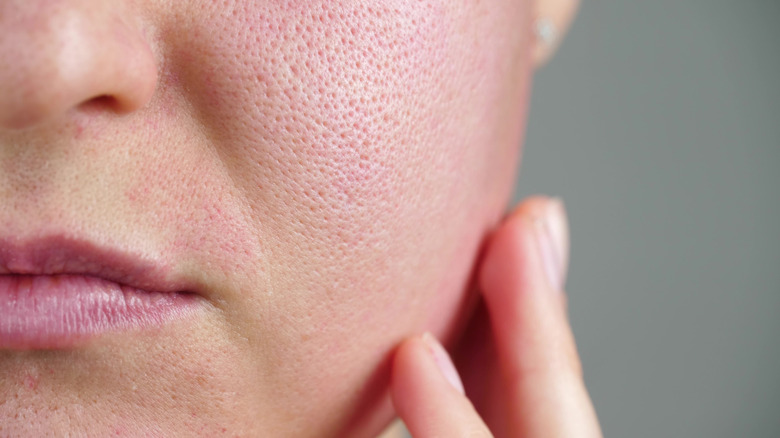You Should Stop Using Apple Cider Vinegar If This Happens To You
Apple cider vinegar is a liquid mixture made from a combination of apples, yeast, sugar, or other carbohydrate that has gone through the fermentation process twice (via Cleveland Clinic). When fermented for the second time, the apple juice that was first fermented by bacteria to create alcohol is then converted into acetic acid, giving us the product we see on grocery store shelves. As a popular ingredient in many recipes such as soups, marinades, smoothies, salad dressings, and more, apple cider vinegar has garnered a reputation for being multifaceted, according to Healthline.
Although the research is minimal, apple cider vinegar is thought to provide a wide range of health benefits related to wound healing, lowering blood pressure, and even reducing blood sugar levels for type 2 diabetes patients (per Everyday Health). Not only that, but raw apple cider vinegar contains antioxidants and may serve as a natural probiotic.
Though it's often taken orally, some people use apple cider vinegar topically. According to Everyday Health, the acetic acid in apple cider vinegar has both antimicrobial and antifungal properties, and therefore may prove useful in the treatment of certain skin conditions. However, the efficacy of apple cider vinegar as a form of skin care treatment is the topic of some debate amongst the medical community. What might prove effective for some, may not prove effective for others.
It may cause skin irritation
Dermatologist at Brigham and Women's Hospital in Boston, Dr. Abigail Waldman, explains to Everyday Health, "If you have a mild condition, it might help, but for more severe cases, it's probably not going to be the end all, be all of products." She adds, "Everyone is a little different, and oily skin probably has a higher tolerance for applying more acidic products. Sensitive, dry skin, has a much lower threshold."
While apple cider vinegar may potentially prove helpful for certain bacterial skin conditions such as acne, or fungal nail infections such as athlete's foot, those with skin conditions like eczema or rosacea are more susceptible to painful skin irritation (via Everyday Health). In addition to physical discomfort, apple cider vinegar that has not been adequately diluted can also cause severe skin burns (per Medical News Today). In a report outlined in The Journal of Clinical and Aesthetic Dermatology, an adolescent girl was medically evaluated after self-applying apple cider vinegar to her nose over the course of three days in an attempt to remove moles that resulted in chemical burns and erosion of the skin.
For this reason, it's important to dilute apple cider vinegar with water prior to usage and limit the amount of time it remains in contact with skin (via Medical News Today). Dr. Waldman suggests diluting 1 tablespoon of apple cider vinegar with 1 cup of water, according to Everyday Health.


